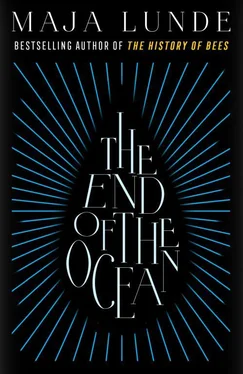The sheriff stood there, hesitating, the three policemen vigilant behind him. Nobody seemed to know what to do with their hands. There were five hundred of us, four of them.
“I believe I have said what I had to say,” the sheriff said, and took a step back.
“And we have heard you, but we are not going to obey,” Daddy said.
“I can only hope that this will have a peaceful resolution,” the sheriff said.
“We support non-violent protest,” Daddy said.
“If you mean that, you should heed the warning and take down the camp.”
There was something helpless about him, now that he no longer had a piece of paper to read from.
“Poor guy,” Magnus murmured.
“Nobody’s forcing him,” I said.
“It’s his job,” Magnus said.
“All right, then,” the sheriff said loudly. “See you soon.”
“You know where to find us,” Daddy said.
The sheriff nodded to the three officers and they retreated.
We cheered, all of us, when the car started and they drove away.
“One–nil for us,” Daddy said.
Magnus didn’t say anything, just walked to the tent and I hurried after him.
It had started drizzling.
“Are you hungry?” I asked.
He shrugged.
I went to get the camping stove and took it outside, suddenly noticing how cold I was, my hands shaking when I went to pour denatured alcohol into the burner. The bottle was already half empty, we would have to get more tomorrow.
I took out a can of beef stew and started heating it up directly over the flame. I didn’t really like the smell of canned food—everything hermetic had a particular flavor, as if it tasted first and foremost of the can, and now the steam rose from the mushy mass in the can, forcing its way into my nostrils. This diet made my nausea worse and it could not possibly be healthy for the child I was carrying.
Magnus was sitting in the tent opening. Behind him the tent was crooked; the canvas hanging between the poles wasn’t properly secured. He just sat there, like a sack of potatoes, even though the dented aluminum plates we were going to eat from were still dirty.
“Aren’t you going to do this?” I tossed him the plates.
“You don’t need to yell.”
“Will you wash them, please?”
“Signe, you know that sooner or later we will have to leave.”
I didn’t answer, kept stirring the stew; it was starting to stick to the bottom, the thin aluminum the can was made of was flimsy.
“Can’t we just leave?” he asked. “Now.”
“Dinner is ready. You have to wash the plates,” I said.
“Signe?”
“The stew is burning.”
“Can’t you at least take a trip down and talk to Iris?” Magnus said.
“What?”
Again, her first name, Iris .
“She’s unbelievably sad, Signe.”
“Have you spoken to her?”
“Please… can’t you meet her halfway?”
Meet her halfway?!
“No,” I said.
“I was there yesterday,” he said.
“When?”
“In the evening.”
I hadn’t even noticed that he was gone.
“She’s so sad that you… both of you… are taking this so personally.”
“As if it were anything but personal.”
“She’s still your mother.”
“Don’t you take it personally? It’s your family. Your valley.”
“I am trying to separate the issue from the people involved.”
I couldn’t help but laugh, a short cough of laughter. “I don’t understand how you think I am supposed to take this. If it’s not personal, what is it, then?”
“The people who came from Oslo, from Bergen,” he nodded towards the bonfire. “They’ve maybe understood it. They’ve come for the cause.”
“No,” I said. “You’re the one who hasn’t understood it. They take it personally, too, it’s their waterfall, their water, their valley, even though they’re not from here.”
He stood there a little while, and a kind of dullness came over him. Then he reached out his arms towards me, smiling wanly. “Sometimes I don’t understand how you can be bothered, Signe.”
“Be bothered? As if I have a choice?”
*
When evening came, I crept into my sleeping bag as usual, but falling asleep was impossible. It was so damp, so raw; it didn’t make any difference how tightly I laced up the bag. It felt like I couldn’t get away from the tent canvas, it was far too close to my face all the time. The taste of burned canned stew and denatured alcohol was still in my mouth, and all of a sudden I was incredibly fed up with the taste of denatured alcohol, the smell of denatured alcohol and with the rain that was still pouring down, the dampness that penetrated everywhere, but I couldn’t share this with Magnus, who was sleeping with his face turned away from me. That would be admitting he was right.
“We’re feeding the wood,” Lou said.
We’d found sandpaper, oil and brushes in the toolshed. Now we were spreading oil on the surfaces of the cracked benches. The wood absorbed everything it was given, like dry soil absorbs water. The oil altered the surface. Softened it. Turned it a warmer shade of brown.
It was the three of us and the boat. I never found out what had happened to the Red Cross. I just wanted to stop time.
We cleaned out the cupboards. Found old books, some cans of food, bedding.
Marguerite dragged a stack of cushions into the cockpit. They smelled moldy.
“The sun will take care of it,” she said, and put the cushions out to air.
While we were working, I thought about Marguerite. About her lips against mine.
I wanted so much to kiss her, constantly, to put my arms around her waist and bury my face in her hair.
But then Lou was there. With her high-pitched voice and those quick eyes of hers that didn’t miss a thing. Or missed everything, I couldn’t tell.
And I didn’t want her to leave us alone, because I liked seeing her close to Marguerite. I liked hearing them talk. Hearing them laugh.
Three days passed.
We didn’t talk about the day before, Marguerite and I, didn’t talk about the day that would come, about the drought, about how long it had been since it had rained.
We just talked about what we ate, the water we drank, about the sun in the sky, the trees along the roadside. About the boat.
Every time we approached another subject, I made sure that we stopped. Or she would, as often as I did. Even Lou helped out, with her chattering and laughter.
She talked a lot about Francis. They had a game, she said, were in the midst of a game. But I didn’t ask what the game was.
Three days passed and then the fourth day came.
Suddenly Lou didn’t want to come with us to the boat. She was going to play with Francis, she said, all day. They had agreed on that.
I gave in. Far too easily. Because I knew what this meant, that we could be alone, Marguerite and I.
We walked to the boat. Neither of us said anything along the way. I didn’t look at her, only at the road in front of me, at the dust that was stirred up by the hot wind. We didn’t walk close to one another, didn’t touch one another, but nonetheless at all times I could feel her body beside mine.
Then we climbed into the boat.
She undressed. It was the first time I had seen her naked in broad daylight.
This time she didn’t remove my hands from her abdomen, from the stretch marks.
I wanted her to tell me, but she said nothing. Said nothing, but didn’t stop me either. Let me get close to her.
It had been a long time since we had showered. We were sticky, salty. A layer of dry dust coated our bodies, was between us, became a part of us, a part of it .
Читать дальше










